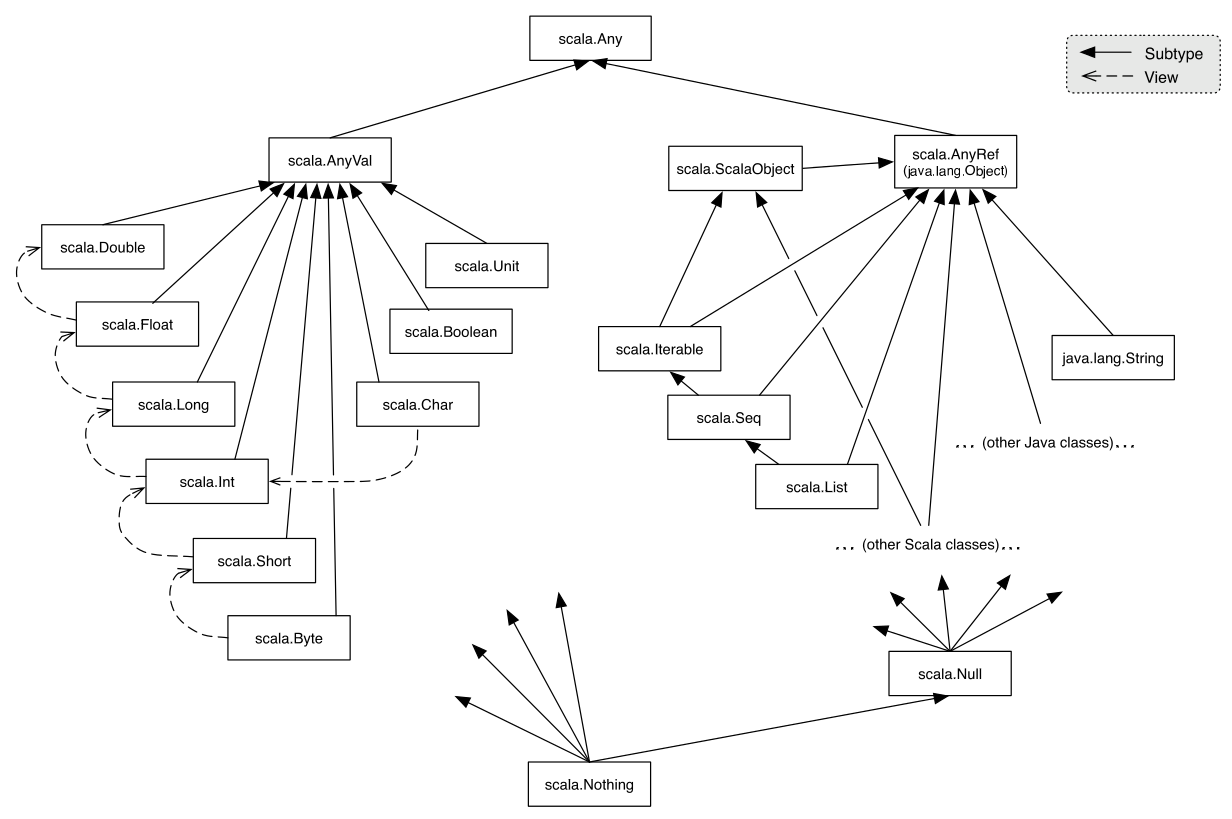Scala Basics
Work in progress
Previous slide : 1- Introduction to scala and Functional
Programming
Scala console
scala> 1+1
res0: Int = 2
scala> res0 + 3
res1: Int = 5
scala> val a = res1 * 10
a: Int = 50
scala> math.sqrt(a)
res2: Double = 7.0710678118654755
Values
scala> val a = 1 // you can declare a variable without a type
a: Int = 1
scala> val b:Int = 1 // Specifying return type is not required
b: Int = 1
scala> val c:Double = 1.5
c: Double = 1.5
scala> val d:Double = 1 // It will cast types if possible (Int->Double)
d: Double = 1.0
scala> val e:Int = 1.5 // If it cannot cast it returns with an error
<console>:11: error: type mismatch;
found : Double(1.5)
required: Int
val e:Int = 1.5
^Values
scala> val i = 10
i: Int = 10
scala> i = 4
<console>:12: error: reassignment to val
i = 4
^
Values : A value cannot be reassigned.
It is similar to Java's Final variable.
But they can be overridden in a sub class.
Variables
scala> var j = 10
j: Int = 10
scala> j=4
j: Int = 4
If you need to change the value then you can use a var instead.
Types of Types

Any Type
Class Any is the root of the Scala class hierarchy. Every class in a Scala execution environment inherits directly or indirectly from this class. Class Any has two direct subclasses: AnyRef and AnyVal.
scala> var a:Any = 1
a: Any = 1
scala> a = "hey"
a: Any = hey
scala> a = 0.0
a: Any = 0.0
scala> a = new util.R
Random Right
scala> a = new util.Random(123)
a: Any = scala.util.Random@54689939
Method invocation
scala> def foo(x:Int=1,y:Int=2) = x+y
foo: (x: Int, y: Int)Int
foo() // Function has predefined default Values
foo(5) // Replaces x with 5, and the default value for y
foo(1,4) // Both parameters are passed
foo(y=6) // Named parameter for y, x takes on the default parameter
foo(x=4,y=6) // Named parameter
foo(y=14,x=6) // Order of the named parameter can be of any order
foo(4,y=2)
scala> def returnFalse() = false
returnFalse: ()Boolean
returnFalse() // Returns false
returnFalse // Also returns false, you can avoid parenthesis
foo // Try this one out ?Suffix Notation
Scala allows methods of arity-0 to be invoked using suffix notation:
scala> val names = "Vishnu,Prasad,Suresh,Ravi" split ","
names: Array[String] = Array(Vishnu, Prasad, Suresh, Ravi)
names.toList
// is the same as
names toList // Unsafe, don't use!
//This style is unsafe, and should not be used.
//Since semicolons are optional,
//the compiler will attempt to treat it as an infix method if it can,
//potentially taking a term from the next line.
names toList
val answer = 42 // will not compile!
Apply methods give you a nice syntactic sugar for when a class or object has one main use.
scala> class Foo {
| def apply() = 0
| }
defined class Foo
scala> object FooMaker {
| def apply() = new Foo
| }
defined module FooMaker
scala> val newFoo = FooMaker()
newFoo: Foo = Foo@5b83f762
scala> newFoo()
res8: Int = 0scala> val a = Array(1,2,3)
a: Array[Int] = Array(1, 2, 3)
scala> a(1)
res5: Int = 2
scala> val b = Map(1->"One",2->"Two")
b: scala.collection.immutable.Map[Int,String] = Map(1 -> One, 2 -> Two)
scala> b(1)
res3: String = One
scala> b(2)
res4: String = TwoIf Statement
if (condition)
//Sucess Block
else
//Failure Block
val a = 10
val b= 13
if(a>b) {
println(a+" is greater")
} else {
println(b+" is greater")
}
if(a>b) println(a+" is greater") else println(b+" is greater")
If Statement
scala> def abs(x: Int): Int = if (x > 0) x else -x
abs: (x: Int)Int
scala> abs(-10)
res14: Int = 10
scala> val x = 10
x: Int = 10
scala> val absoluteX = if (x > 0) x else -x
absoluteX: Int = 10
scala> val y = -10
y: Int = -10
scala> val absoluteY = if (y > 0) y else -y
absoluteY: Int = 10For Loop
for ( var x <- Range) {
//Code Block
}
for (x <- 1 to 10) {
println("Value of x: " + x)
}
val (a, b) = (1 to 5).map(i => (i, i*10)).toArray.unzip
for(x<-a;y<-b){
println(x,y)
}
For Loop with Yield
for {
x <- a
} yield x
for {
x <- a
y <- b
} yield (x,y)
for {
x <- a
y <- b
} yield (x,y,x<y)
For further Reading on Yield checkout : How does yield work?
While Loop
while(condition){
statement(s);
}
var i = 0
while (i < 20) {
println("Value of i: " + i)
i = i + 1
}
while (true) {
println("Infinite Loop")
}
Note: Never omit braces (while cannot be used in a pure-functional manner).
Pattern Matching
x match {
case value => { //Code Block }
case value => { //Code Block }
case _ => { //Default Code Block }
}
x match {
case _:Type => { //Code Block }
case _:Type => { //Code Block }
case _ => { //Default Code Block }
}
Scala has a built-in general pattern matching mechanism. It allows to match on any sort of data with a first-match policy.
Pattern Matching
x match {
case "One" => 1
case "Two" => 2
case _ => 0
}
x match {
case _: String => x.asInstanceOf[String]
case _: Double => x.asInstanceOf[Double].toString
case _ => x.toString
}
x match {
case v: String => v.toString
case v: Double => v.toString
case v => v.toString
}Thank you
Next Slide : 3- Scala-collections